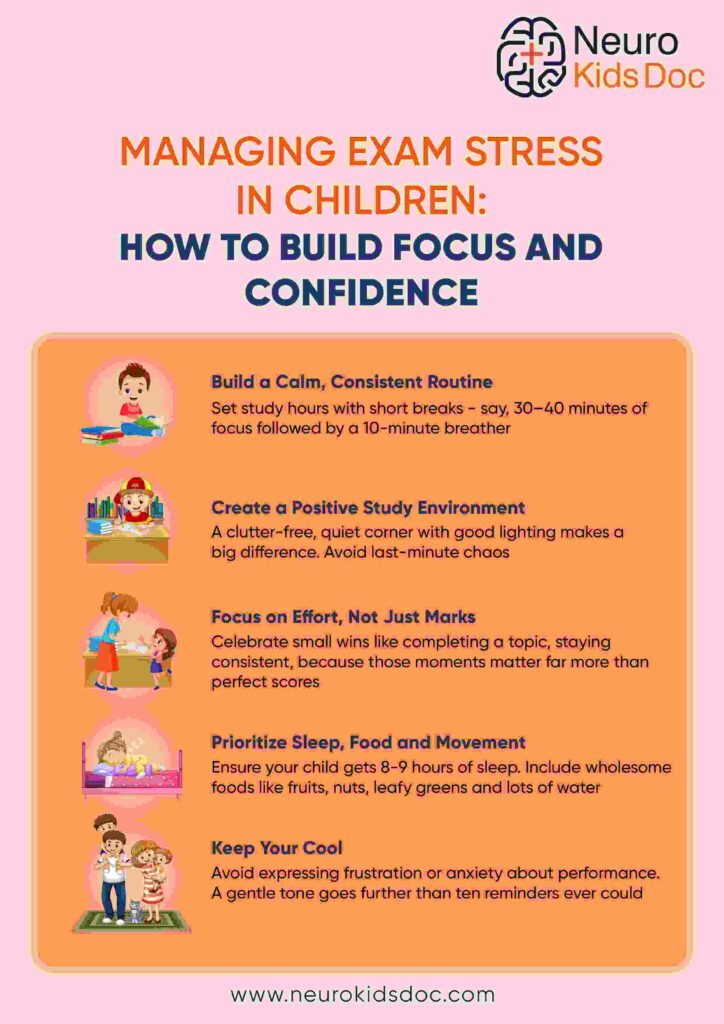During exam season, you might notice your child pacing more than usual or sighing at the sight of their notes. And as a parent, you may feel your own heart racing with theirs.
Take a deep breath.
Exam stress is completely normal, but it doesn’t have to overwhelm your child or your home.
Why Children Feel Exam Stress in Children
Children experience stress for the same reasons adults do: pressure, expectations, and a fear of failure.
The difference is, they don’t always have the tools to express it.
When stress hormones like cortisol rise, children might struggle to concentrate, forget what they’ve learned, or even fall sick before exams. Some may appear withdrawn, while others become irritable. A few might just say, “I don’t want to study,” when what they really mean is, “I’m scared I won’t do well.”
Recognizing that fear is the first step to helping them through it.
Practical Ways Parents Can Help

1. Build a Calm, Consistent Routine
Children thrive on predictability. Set study hours with short breaks — say, 30–40 minutes of focus followed by a 10-minute breather. Encourage light physical activity or stretching during breaks. A calm rhythm helps reduce overwhelm and keeps focus sharp.
2. Create a Positive Study Environment
A clutter-free, quiet corner with good lighting makes a big difference. Avoid last-minute chaos. Stick revision charts on walls or use color-coded notes — visuals make studying less intimidating.
3. Focus on Effort, Not Just Marks
Instead of “How many chapters are left?” try asking, “What did you enjoy learning today?”
This simple shift in conversation builds confidence and reduces fear.
Celebrate small wins like completing a topic, staying consistent, because those moments matter far more than perfect scores.
4. Keep Your Cool
Children are emotional mirrors. If they see you calm and encouraging, they learn that exams are manageable. Avoid expressing frustration or anxiety about performance. A gentle tone goes further than ten reminders ever could.
5. Prioritize Sleep, Food, and Movement
A well-rested, nourished brain learns faster. Ensure your child gets 8–9 hours of sleep.
Include wholesome foods like fruits, nuts, leafy greens, and lots of water. Avoid sugary snacks; they give quick energy but cause sudden drops in focus.
Helping Children Stay Emotionally Grounded
Sometimes, what children need most isn’t more study time, it’s reassurance.
Tell them that exams are a way to measure progress, not worth. Share your own stories of struggling and learning; it helps them feel less alone.
Encourage simple relaxation techniques like deep breathing, short walks, or journaling feelings. If your child worries excessively, help them visualize walking into the exam hall calm and prepared.
That mental rehearsal alone can lower stress levels.
When Stress Becomes Too Much
If your child starts losing sleep, has frequent stomach aches, or seems unusually withdrawn, it might be time to talk to a professional. Pediatric neurologists and child psychologists can guide both parents and children in managing anxiety and focus issues effectively.
Early understanding always helps, not just for exams, but for life.
Summing Up
Exams come and go, but the lessons we teach our children about handling pressure last forever. When you remind your child that they are loved and supported no matter what, you give them the confidence that no test can measure.








